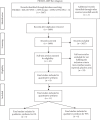EGFR Polymorphism and Survival of NSCLC Patients Treated with TKIs: A Systematic Review and Meta-Analysis
- PMID: 32256580
- PMCID: PMC7104312
- DOI: 10.1155/2020/1973241
EGFR Polymorphism and Survival of NSCLC Patients Treated with TKIs: A Systematic Review and Meta-Analysis
Abstract
Tyrosine kinase inhibitor- (TKI-) based therapy revolutionized the overall survival and the quality of life in non-small-cell lung cancer (NSCLC) patients that have epidermal growth factor receptor (EGFR) mutations. However, EGFR is a highly polymorphic and mutation-prone gene, with over 1200 single nucleotide polymorphisms (SNPs). Since the role of EFGR polymorphism on the treatment outcome is still a matter of debate, this research analyzed the available literature data, according to the PRISMA guidelines for meta-analyses. Research includes PubMed, Scopus, ISI Web of Science, and 14 of genome-wide association studies (GWAS) electronic databases in order to provide quantitative assessment of the association between ten investigated EGFR SNPs and the survival of NSCLC patients. The pooled HR and their 95% CI for OS and PFS for different EGFR polymorphisms using a random or fixed effect model based on the calculated heterogeneity between the studies was applied. The longest and the shortest median OSs were reported for the homozygous wild genotype and a variant allele carriers for rs712829 (-216G>T), respectively. Quantitative synthesis in our study shows that out of ten investigated EGFR SNPs (rs11543848, rs11568315, rs11977388, rs2075102, rs2227983, rs2293347, rs4947492, rs712829, rs712830, and rs7809028), only four, namely, rs712829 (-216G>T), rs11568315 (CA repeat), rs2293347 (D994D), and rs4947492, have been reported to affect the outcome of TKI-based NSCLC treatment. Of these, only -216G>T and variable CA repeat polymorphisms have been confirmed by meta-analysis of available data to significantly affect OS and PFS in gefitinib- or erlotinib-treated NSCLC patients.
Copyright © 2020 Vladimir Jurisic et al.
Conflict of interest statement
The authors declare that there are no conflicts of interest regarding the publication of this paper.
Figures



References
Publication types
LinkOut - more resources
Full Text Sources
Research Materials
Miscellaneous

